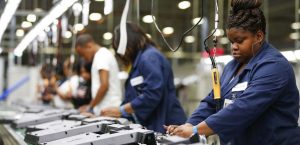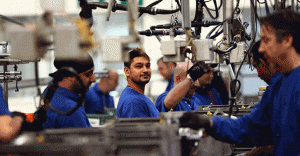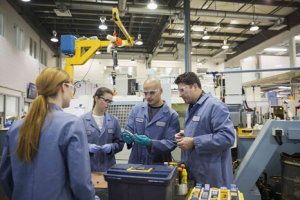One can’t attend an economic development forum, technical college recruitment, or any chamber of commerce meeting without hearing the mention of high paying jobs in South Carolina.
In addition, employers (large and small) continue to scream for skilled workers. I’ve heard comments like, “Attend a trade school; get a two-year degree in welding and you can make $80K per year.” “Kids that attend a technical school and get a two-year degree can have a high paying job for life in aerospace.”
Sounds great and should be a big draw for students and others looking for a good career path. The promise of high paying jobs should be a strong attraction. However, we continue to struggle to find students willing to enter the world of manufacturing.
Why? Do potential students and career advisers fear that this boom will not last?
Let’s consider some facts.
Remember your high school economics classes. I dare to say that most of us studied capitalism, Adam Smith, Laissez faire economics. For those who may have forgotten; Laissez-faire is an economic system where free trade occurs between individuals or other parties without interference such as government regulation, tariffs or subsidies.
In this type of free market, the law of supply and demand will dictate the price. Consider how you manage your family purchases. We rush to our favorite source (internet, big box store, local shops), shop for the lowest price, and make our purchase. When a product is rare, or there are limited producers, we are willing to pay more.
In fact, the seller can get a much higher price if there is demand for a product in short supply. In the not too distant past, consumers had limited access to products. Usually, purchases were made at a local store or by mail order through a catalog sale. The internet has made worldwide shopping possible. And, with two-day free delivery, there is nothing to stop a buyer from shopping a nearly infinite number of sources.
But does this have anything to do with high paying manufacturing and STEM related jobs in South Carolina?
After all, these high paying manufacturing jobs produce products that are not commodities readily available on Amazon or eBay. Do our higher paying manufacturing jobs and STEM related services compete in a world market? Yes!
The U.S. still has some of the best manufacturing and engineering talent in the world. The American worker has a heritage of hard work, technical competence, and ingenuity. We are the only country to land a man on the moon. Post WWII, America developed into an economy that became the envy of the rest of the world. Even so, in the late twentieth century, we saw manufacturing work leaving the US for more economical solutions overseas.
The textile industry in South Carolina was a prime example of the change. The big three automakers are no longer the “big three.” At the same time, high school career counselors and parents were telling their students that the only way to be successful was to attain a college bachelor’s degree. All these factors have contributed to a lack of manufacturing capability inside the US.
Given the US standard of living, will our manufacturers be able to compete if we can re-build the capacity?
Our “high paying jobs” don’t pay as well overseas. For example, engineers and manufacturers in some European and Asian countries make pennies on the dollar of a comparable person in the US. Pricing on products manufactured in those countries is less than in the US.
In fact, in some cases the pricing is so much lower that the US companies can’t compete. Labor and materials are often the two highest controllable costs. As a services provider, the single biggest controllable cost at KTM Solutions is labor. When our business competes with engineering providers in the Asian and European market, we often don’t do well unless we are offering a service that is unique and not attainable overseas.
So, are these “high paying jobs” so unique that the same services can’t be attained overseas? I venture to say that a good qualified welder in Mexico will not make the same wage as a good qualified welder in the U.S. We need to understand clearly where we can best compete. For example, some jobs must be done locally.
Increased volumes of work can also reduce overhead burdens and make the US product more competitive. With the increases in manufacturing technology, it is possible to enhance production efficiency such that the US worker can compete on the world scale without sacrifice to the standard of living.
Businesses and workers alike need to recognize that we live in a world of competition. To win we need to work hard. No victory comes without sacrifice. We need to pick wisely where we choose to compete.
However, I believe we are at a place where we can return to a leadership position if we simply choose to do so. The demand is there. Laissez-faire. Will we seize the opportunity and at what sacrifice? You decide.
 ABOUT THE AUTHOR: Paul V. Kumler, P.E. is president of KTM Solutions, an engineering company that services the aerospace and large-scale manufacturing industries. In addition to aero structures engineering services, KTM Solutions designs and builds tooling supporting a broad clientele and various industries. The company is headquartered in Greer, South Carolina with remote offices in Charleston, South Carolina. Mr. Kumler serves in several volunteer roles including the SC Aerospace Advisory Board. Mr. Kumler, a professional engineer, is licensed in Louisiana, South Carolina, Texas and Washington. He is married to Ginger A. Kumler, is the parent of two adult children and two grandchildren.
ABOUT THE AUTHOR: Paul V. Kumler, P.E. is president of KTM Solutions, an engineering company that services the aerospace and large-scale manufacturing industries. In addition to aero structures engineering services, KTM Solutions designs and builds tooling supporting a broad clientele and various industries. The company is headquartered in Greer, South Carolina with remote offices in Charleston, South Carolina. Mr. Kumler serves in several volunteer roles including the SC Aerospace Advisory Board. Mr. Kumler, a professional engineer, is licensed in Louisiana, South Carolina, Texas and Washington. He is married to Ginger A. Kumler, is the parent of two adult children and two grandchildren.






Be the first to comment on "High Paying Jobs in Manufacturing – Fact or Fiction?"